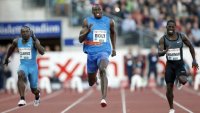- Join the France 24 community here
- Log in
Latest update: 06/08/2012
- London 2012 Games - Usain Bolt
French book examines why black sprinters dominate the Olympics
The 2012 Olympics has again seen black athletes commanding the sprint events. For French journalist Jean-Philippe Leclaire, author of "Why Whites Run Slower", this dominance can be explained by a combination of the right genes and hard work.
By FRANCE 24 (text)
Ever since American runner Jesse Owens took the 1936 Berlin Olympics by storm, black athletes have generally reigned supreme in the sprints at international tournaments.
The last 25 holders of the world record for the 100-metre race have all been black and data compiled in 2007 revealed that 494 out of the 500 best-ever 100-metre sprint times are held by athletes primarily of West African origin.
The lineup for Sunday's 100-metre final at London's Olympic stadium once again demonstrates the dominance of black sprinters.
Despite the glaring statistics, the topic was somewhat of a taboo subject until recent years. Most scientists, authors and journalists avoided any quest for an explanation out of a fear of being accused of racial stereotyping.
But, in 2010, French author Jean-Philippe Leclaire, a former editor in chief of popular French sports newspaper "L’Equipe", took it upon himself to examine the evidence. Inspired by the emergence of white French sprinter Christophe Lemaitre and by American author Jon Entine's book “Taboo: Why black athletes dominate sport and why we’re afraid to talk about it”, Leclaire decided to dedicate a year and a half of his life to breaking that taboo.
Breaking down stereotypes
He approached scientists, journalists and athletes, and travelled to Jamaica -- the homeland of sprint marvel Usain Bolt -- to find out why “black power” reigns supreme on the track. In June of this year, his findings and conclusions were published in “Why Whites Run Slower”.
“I had been commissioned to write a biography of Usain Bolt at a time when Lemaitre became the first white athlete capable of running the 100-metre in under 10 seconds,” Leclaire told FRANCE 24. Lemaitre’s success on the track stirred the former athletics columnist to expand his mission slightly.
“Up to now, apart from Lemaitre and Australia’s Patrick Johnson, all the sprinters who have run the 100-metre in under 10 seconds were either born in West Africa or were descendants from slaves from West Africa,” he said.
“Lemaitre broke down all the prejudices and stereotyping, so I decided to write a book to raise the debate around this issue,” he said.
Over 361 pages, Leclaire examined the link between sporting performance and country of origin.
He studied a range of existing theories, including one that points to the so-called “innate muscle” makeup of black sprinters and another that argues that the supposed greater length of Kenyan runners’ femurs gave them an advantage. Other arguments revolved around the apparent thinner skin and lighter internal organs of black athletes.
In a 2010 study, two American academics insisted that black athletes' dominance of the sport was down to their higher centre of gravity.
The legacy of slavery and the need to escape poverty are also more controversial theories that have come and gone.
Sprinting gene
By the end of his research, Leclaire was left in no doubt. For him, “athletic performance is largely determined by genetics and specifically ACTN3, the so-called ‘sprint gene’”.
The ACTN3 was discovered for the first time by a team of Australian researchers in 2003. It is a gene present in all humans in two forms, either the RR form which helps speed, or the RX form which aids endurance.
“Since its discovery, a lot of research has shown that the RR form of the gene gives those who hold it explosive muscle power when the body is put under a certain amount of physical stress, so it’s a natural predisposition for sprinters,” Leclaire explained.
“If you had a weak form of ACTN 3, it would be impossible to match the great sprinters,” he said.
Leclaire concluded that the genes favourable for sprinting are more commonly found in those of West African origin.
There are exceptions, of course, which explains how French sprinter Lemaitre has been able to compete in the same class as the likes of Bolt and fellow Jamaican sprinter Yohan Blake.
“Lemaitre posesses the same genetic combinations that you find in most of the athletes of West African origin. He is the exception that confirms the rule,” Leclaire said.
East Africa, by contrast, is the land of the long-distance runner.
Author John Entine believes genetics also explains the continuing supremacy of Kenya’s runners in long distance races.
“They are short and slender with huge natural lung capacity and a preponderance of slow twitch muscles, the energy system for endurance sports,” Entine wrote on the website blackathlete.net. “It’s a perfect biomechanical package for long-distance running but a disaster for sports that require anaerobic bursts of speed.”
It’s not all biological
However, anyone thinking that they’ll able to challenge Usain Bolt at the London Olympics just because they possess the ACTN3 gene can forget it.
“Sociocultural factors also come in to play,” said Leclaire. “And it’s also a question of personality. Jessie Owens, Tommie Smith, Marie-Jose Perec and Usain Bolt became who they are thanks to training and the choices they have made as well as their genetic makeup.”
The director of the Copenhagen Muscle Research Institute, Bengt Saltin, believes an athlete's “environment” can account for 20 to 25 percent of his speed, but that the rest is down to birth.
Some of the many scientists and authors who have broached the issue in recent years preach caution about a tendency to fall into the trap of racially stereotyping athletes.
Matthew Syed, author of the book "Bounce: The Myth of Talent and the Power of Practice" points out that a host of West African countries including Ivory Coast, Senegal, Congo and Angola have never produced an Olympic sprint champion.
“Just because some black people are good at something does not imply that black people in general will be good at it,” Syed told the BBC.
Related Content
SPORTS news, stories and scores - Football, tennis, F1…





























